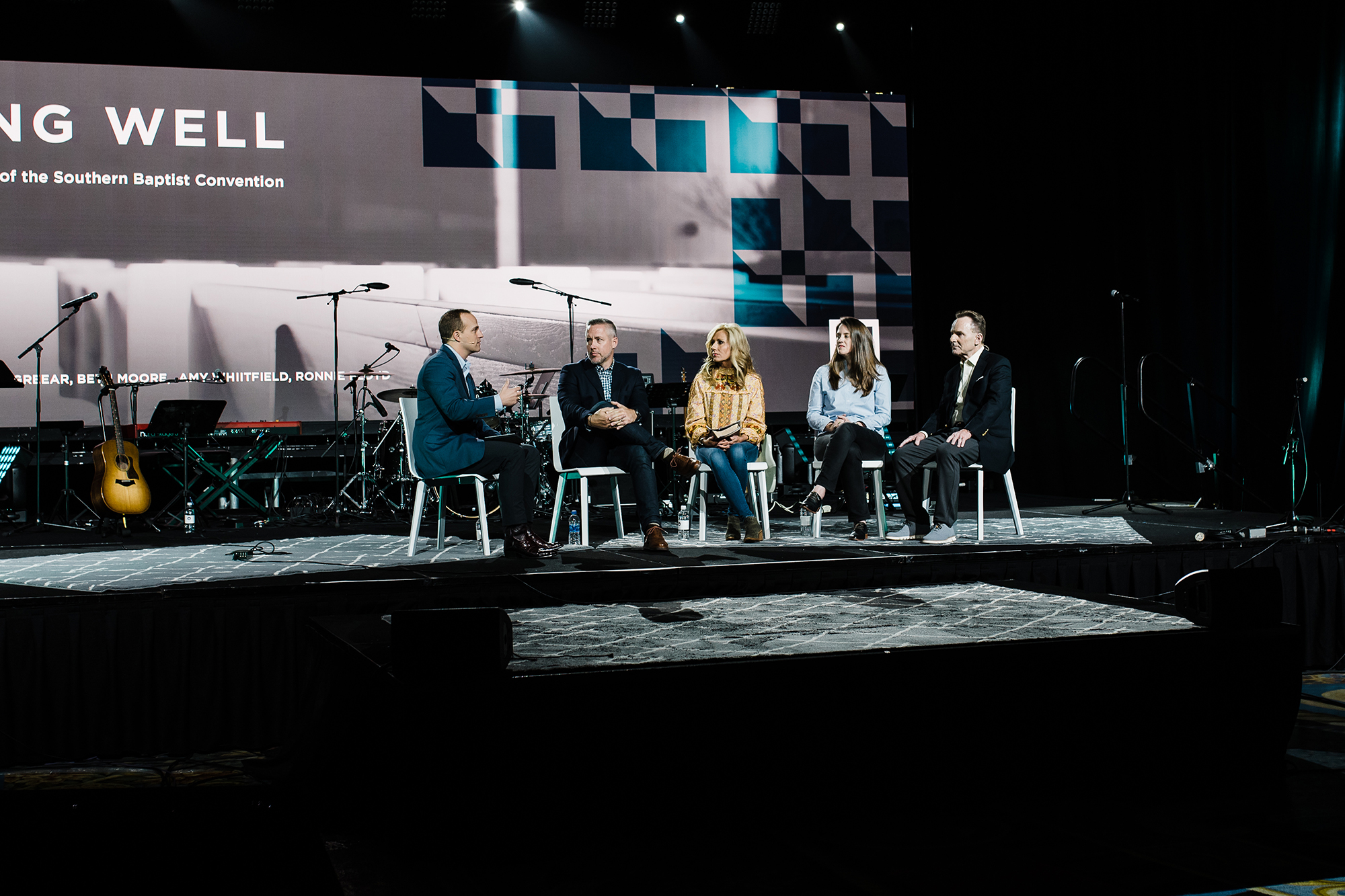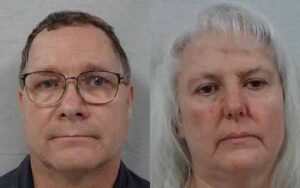
GRAPEVINE, Texas (BP) — Speakers from outside and inside the Southern Baptist Convention addressed the topic of sexual abuse and churches’ response Oct. 3-5 at a national conference.
 Survivors and advocates pointed to missteps and a desire for repentance in the SBC, while Southern Baptist leaders urged pastors and churches not to fall short in caring for victims and preventing abuse during the Ethics & Religious Liberty Commission’s (ERLC) sixth annual national conference hosted in partnership with the SBC Sexual Abuse Advisory Group. An audience of more than 1,650 registered for the event, which was titled “Caring Well: Equipping the Church to Confront the Abuse Crisis.”
Survivors and advocates pointed to missteps and a desire for repentance in the SBC, while Southern Baptist leaders urged pastors and churches not to fall short in caring for victims and preventing abuse during the Ethics & Religious Liberty Commission’s (ERLC) sixth annual national conference hosted in partnership with the SBC Sexual Abuse Advisory Group. An audience of more than 1,650 registered for the event, which was titled “Caring Well: Equipping the Church to Confront the Abuse Crisis.”
In the final address of the conference, leading survivors’ advocate Rachael Denhollander said Southern Baptists need to understand victims’ fear of “coming forward is very, very well founded, because most of the time when they speak up they are trampled on, and this has happened in the SBC over and over and over again.”
“It is up to you to change the tone and the culture,” Denhollander told Southern Baptists in the audience. “It is up to you to elect people who are going to tell the truth and fight for survivors. It is up to you to surround them with care and support so that [the] fear of coming forward becomes no longer well founded.”
ERLC Executive Vice President Phillip Bethancourt issued a warning from within the convention, questioning whether the SBC will have a future if it does not correct its missteps on sexual abuse.
“[I]f the system is more important than the survivors, then the system is not worth saving,” he said. “If we aren’t willing to do whatever it takes to care for survivors more than ourselves, then we ought to die as a denomination. What good is it if we cooperate for the global concern of salvation if we aren’t willing to cooperate for the generous care of survivors?”
 The conference came after more than a year of growing awareness of sexual abuse in Southern Baptist churches and entities, as well as a lack of accountability in many instances over many years.
The conference came after more than a year of growing awareness of sexual abuse in Southern Baptist churches and entities, as well as a lack of accountability in many instances over many years.
In a series of investigative reports that began in February, the Houston Chronicle — joined by the San Antonio Express-News — found about 400 leaders and volunteers in Southern Baptist churches who have been convicted, taken plea deals or been credibly accused of sex crimes or misconduct involving more than 700 victims during the last two decades.
SBC leaders had initiated in 2018 an effort to respond to a growing awareness of the problem. J.D. Greear formed the Sexual Abuse Advisory Study shortly after his election as SBC president in June of that year. Working in cooperation with the ERLC, the study group has received input from hundreds of people, including abuse survivors and their advocates, lawyers, pastors, law enforcement officials, counselors and denominational leaders.
In addition to other collaborative efforts of the Sexual Abuse Advisory Study and the ERLC, messengers to the SBC annual meeting in June approved amendments to the convention’s constitution to specify that both sexual abuse as well as discrimination based on ethnicity are grounds for a church to be deemed “not in friendly cooperation” with the convention. They also voted to amend the SBC’s bylaws to reshape the Credentials Committee into a standing panel to inquire into and recommend actions regarding incidents of sexual abuse, racism or other issues that call a church’s relationship with the SBC into question.
Greear said a common criticism that the convention’s steps so far are “all talk and no action” was “very fair and understandable.”
“This Sexual Abuse Advisory Group has hammered that over and over,” he said during an Oct. 3 panel discussion. “It cannot be documents, It cannot be sermons. It cannot be virtue signaling. It has to be action….
“It’s not time for victory laps.”
Ronnie Floyd, SBC Executive Committee president, was asked on the same panel why it has taken Southern Baptists so long to respond to sexual abuse.
 “Quite honestly, I don’t know the answer to that,” he said. “What I do know is that there’s a pretty unhealthy culture at times in the Southern Baptist Convention, which personifies probably the unhealthy culture of many of our churches. And the more unhealthy a church is, the less likely they are going to be able to deal with whatever may come their way, especially this kind of a very difficult issue.”
“Quite honestly, I don’t know the answer to that,” he said. “What I do know is that there’s a pretty unhealthy culture at times in the Southern Baptist Convention, which personifies probably the unhealthy culture of many of our churches. And the more unhealthy a church is, the less likely they are going to be able to deal with whatever may come their way, especially this kind of a very difficult issue.”
Floyd urged Southern Baptists to “establish a healthy culture together” and encouraged pastors to preach on sexual abuse from the Bible.
Also on the panel, Amy Whitfield, the Executive Committee’s new associate vice president for convention communications, told attendees local church autonomy in the SBC “does not absolve us from accountability.”
Sexual abuse must be handled at the different levels of the convention, she said. “Everybody has to show up for a different kind of culture…. [I]t also has to mean doing the hard things together.”
The three-day conference included testimonies from abuse survivors, who all received standing ovations after they spoke. It also included a time of lament and prayers for survivors.
In addition to speakers and panels during the main sessions, the event also featured breakout sessions that addressed such matters as how to prevent abuse in churches and how to help survivors heal.
Diane Langberg, a psychologist with 47 years of experience in helping trauma and abuse victims, said pastors and other Christian leaders have used power for their benefit rather than for the aid of survivors.
“I fear a portion of Christendom today has become less interested in truth and more interested in power,” she said.
Langberg also said she fears “many of us have confused Christendom for Christ. They are not the same. They have never been the same. Institutions, organizations, ministries are not Jesus Christ.”
Jamie Ivey, a podcaster and speaker, provided guidance for those who seek to minister to a family affected by the abuse of one of its members. Speaking from her experience of seeking to serve a family during such trauma, she advised:
— “We can offer our presence before we offer our answers.
— “[Y]our presence is needed for the long haul.
— “We are to mourn with them.”
“When abuse hits a family, there’s no GoFundMe page, there’s no Instagram posts…. It is a lonely battle,” she said.
Gary Haugen — founder and CEO of International Justice Mission, the world’s largest anti-slavery organization — said he has learned in the group’s more than 20 years “the struggle for justice is not about whether we care. It’s about whether, by the strength of Jesus, we persevere.”
“In the fight against abuse, if the good guys do not go away, they will eventually prevail,” he told the audience. “[F]rom this moment forward, this fight is all about one thing — the godly power of perseverance.
“For in all matters of justice and righteousness, the Word of God is clear — God is not mocked,” Haugen said. “So do not grow weary in doing what is right for at the right time you will reap a harvest if you do not give up.”













